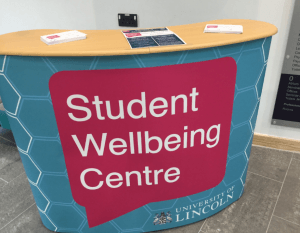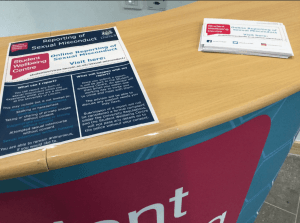At the University of Lincoln we will shortly be advising that all of our staff and students complete bystander intervention modules. If you are wondering what bystander intervention is, how it works or why you should complete the module, please have a look at the information below.
What is bystander intervention?
Bystander intervention programmes are all about helping you to be an active bystander. An active bystander is someone who is able to recognise problematic behaviour, decide on the most appropriate course of action and then take it. This is something that most of us do on a regular basis, but when it comes to sexual misconduct we might find this more difficult. Sometimes you might want to intervene in an incident you have witnessed, but you may not know how. You may also think you are the only person who is uncomfortable, and therefore decide not to take any action. In fact, there is probably at least one other person thinking the same way as you, and by speaking up you might give them to confidence to speak up too.
Being an active bystander is about taking the responsibility off survivors of sexual misconduct to challenge cultures that enable sexual misconduct. It is down to all of us to challenge abusive or discriminatory behaviour and to support those who experience it.
How does bystander intervention work?
Bystander intervention works by changing social norms, which we can use to help us change cultures on campus. By challenging something, you are sending a message to everyone around you that it is unacceptable. Although challenging an incident of ‘everyday’ behaviour, such as someone making an inappropriate joke, might feel quite small on its own, when lots of people make an intervention that makes a lot of interventions collectively! When a large enough group of people come to view that behaviour as unacceptable, then there has been a shift in social norms.
In the module you will find some suggestions for how you can intervene in different situations, it can be really helpful to learn a few of these to that they are easy to recall if you ever need them.
Why is it important that I do the module?
Bystander intervention works best when lots of people are reinforcing the same message, as this will create a new social norm much more quickly and effectively. This is why we are asking that all of our staff and students complete the modules.
Bystander intervention programmes are not about making you do something that you feel uncomfortable with. In a lot of scenarios, there will be no single right answer for how to react. Instead, bystander intervention education is about making sure that you have the right knowledge and strategies to feel confident enough to intervene, in a way that keeps you and others safe.
The modules will also provide you with information on how you can advise and support a friend or student who has experienced sexual misconduct. Whilst you may not have experienced someone disclosing to you before, it is really important that you think about the sorts of things you could say or do in that situation before it happens, so that you would be able to offer them the right advice and support.
If you ever do need support with advising a student who has experienced sexual misconduct, you can contact our Student Wellbeing Centre by calling 01522 886400 or emailing studentwellbeing@lincoln.ac.uk.

